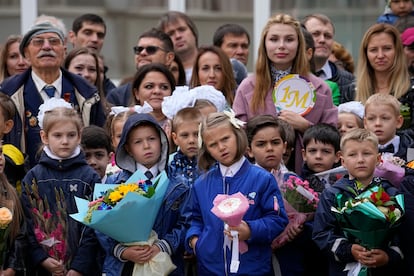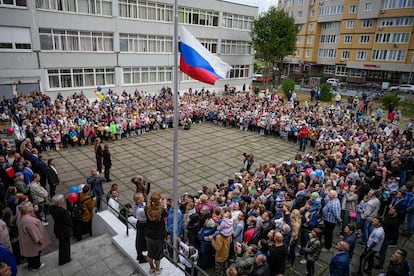Russia starts school year with new lesson: ‘There’s nothing to fear in dying for the motherland’
Educational institutions throughout the country mandate a weekly flag-raising ceremony and lectures about the ‘special operation’ in Ukraine


September 1 is a special day for Russian children. In one Moscow suburb, students got all dressed up and brought flowers to a school ceremony accompanied by proud parents. The kids chatted with teachers and played in the courtyard as they waited for things to get underway. The ceremony began with singing and the raising of the Russian flag, a mandatory scholastic event initiated this year. It’s a familiar tradition in many countries, but Vladimir Putin has introduced another compulsory extracurricular activity in schools – a class called Important Conversations.
The teachers’ guide for Important Conversations is very clear. A lesson for 10-year-olds poses the question, “What Russian sayings show that working for a more prosperous and beautiful motherland is an expression of love?” The preferred answers are conveniently provided. “Do not spare your strength nor your life for the motherland”; “The motherland’s happiness is worth more than life itself”; “There is nothing to fear in dying for the motherland”; and “To serve the motherland is to love the motherland.”
The question is part of a lesson for grades 5-9 (ages 11-15) called Our Country is Russia that touches on the war in Ukraine. The chapter begins with, “We see expressions of genuine patriotism every day, especially in the special military operation.” It then recites the official rationale for the war: “… firm and immediate measures were needed [in Ukraine]”, including “… protecting the people in the Donbas region from harassment by the Kyiv regime, disarming Ukraine and preventing the deployment of NATO military bases there.”
The lesson ends with anecdotes about the battlefield exploits of several Russian soldiers, including a description of an ambush where the Russian hero “… discovered the Ukrainian nationalists and drove them into a minefield where they finally surrendered.” It also praises several seriously wounded veterans and encourages the students to read the educational material.
“Are Russians patriotic?” is one of the key questions teachers will have to ask the kids. But politics were conspicuously absent on this first day of school. Instead of flags, the children held blue and purple balloons, and no one wore the “Z” symbol of support for the invasion of Ukraine on their new school clothes. The war was far away from the school courtyard that day.
A police car was standing guard outside the school. The first day ended early, around noon, and the children excitedly told their parents all about it on the way home. Lena Penzin, one of the mothers, summed it up, “New school, new teacher, new friends.”

Flag-raising ceremonies in schools were optional until Vladimir Putin made it compulsory this year. In May, the government budgeted 10 billion rubles (US$166 million) to buy flags and other state symbols for schools. From now on, every school will begin the week with a flag-raising ceremony.
The Important Conversations guides for October are not yet available, but the topic for October 24 called “Traditional Family Values” makes it easy to guess what the conversations will be about that day. The Russian Parliament recently decided to consider an amendment to an existing law regarding dissemination of “homosexual propaganda” to minors, which will broaden its scope to prohibit discussion of such topics between adults and on the internet.
Some of the topics included in the Important Conversations curriculum are alarming. A section about Andrei Sakharov, a Nobel Peace Prize laureate who was persecuted by the Soviet regime for his defense of human rights, never mentions his activism. “This outstanding nuclear scientist was the father of the AN-602 hydrogen bomb, which came to be known as the Tsar Bomba during tests,” says the manual, leaving out the fact that Sakharov was only one member of a large team of scientists.
Important Conversations will officially begin on September 5, but President Vladimir Putin inaugurated the activity at an event in Kaliningrad on September 1. In his speech to the crowd of youths attending the event, Putin said, “Ukraine was creating an anti-Russian enclave that threatens our country… Our boys are fighting there to defend the people of the Donbas region and Russia itself, and this deserves the support of every Russian.”
Every Monday, students will be required to attend Important Conversations, which appears to be more of a lecture series than teacher-student conversations. Criticizing the invasion of Ukraine is punishable by imprisonment under Russian laws that prohibit “discrediting the armed forces” and “spreading false information.” Alexei Gorinov, a Moscow city council member, was sentenced to seven years in prison in late July for denouncing the Russian bombings that killed Ukrainian children.
Education Minister Sergey Kravtsov recently announced that every school principal will be assigned an “advisor” from his department. In addition, Kravtsov will head the government’s new patriotic youth movement in schools, which he promises will be voluntary. This new organization will be called Bolshaya Peremena (Great Pause, in Russian) and will emulate Lenin’s Pioneers to “promote state policies” among children and youths.
The start of the new school year coincided with an abrupt end to Moscow’s exceptionally hot summer, and some parents were not happy about it. “I have nothing to say, except that it’s very cold. I hate school,” Nina told us. Storm clouds covered the Moscow sky as she accompanied her son to school. “Fourth grade...that means we’re almost a third of the way there. Patience…” she told herself as a storm brewed on the horizon.
Tu suscripción se está usando en otro dispositivo
¿Quieres añadir otro usuario a tu suscripción?
Si continúas leyendo en este dispositivo, no se podrá leer en el otro.
FlechaTu suscripción se está usando en otro dispositivo y solo puedes acceder a EL PAÍS desde un dispositivo a la vez.
Si quieres compartir tu cuenta, cambia tu suscripción a la modalidad Premium, así podrás añadir otro usuario. Cada uno accederá con su propia cuenta de email, lo que os permitirá personalizar vuestra experiencia en EL PAÍS.
¿Tienes una suscripción de empresa? Accede aquí para contratar más cuentas.
En el caso de no saber quién está usando tu cuenta, te recomendamos cambiar tu contraseña aquí.
Si decides continuar compartiendo tu cuenta, este mensaje se mostrará en tu dispositivo y en el de la otra persona que está usando tu cuenta de forma indefinida, afectando a tu experiencia de lectura. Puedes consultar aquí los términos y condiciones de la suscripción digital.








































